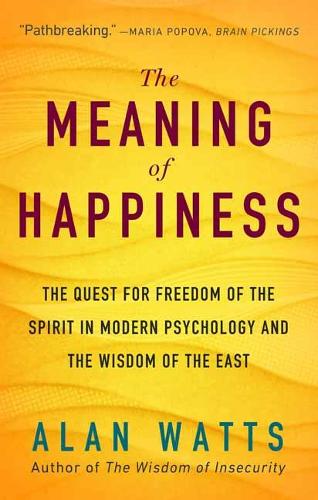
The Meaning of Happiness: The Quest for Freedom of the Spirit in Modern Psychology and the Wisdom of the East
(Paperback)
Publishing Details
The Meaning of Happiness: The Quest for Freedom of the Spirit in Modern Psychology and the Wisdom of the East
By (Author) Alan Watts
New World Library
New World Library
1st October 2018
25th September 2018
United States
Classifications
General
Non Fiction
158
Physical Properties
Paperback
256
Width 133mm, Height 203mm
Description
Deep down, most people think that happiness comes from having or doing something. Here, in Alan Wattss groundbreaking third book (originally published in 1940), he offers a more challenging thesis: authentic happiness comes from embracing life as a whole in all its contradictions and paradoxes, an attitude that Watts calls the way of acceptance. Drawing on Eastern philosophy, Western mysticism, and analytic psychology, Watts demonstrates that happiness comes from accepting both the outer world around us and the inner world inside us the unconscious mind, with its irrational desires, lurking beyond the awareness of the ego. Although written early in his career, The Meaning of Happiness displays the hallmarks of his mature style: the crystal-clear writing, the homespun analogies, the dry wit, and the breadth of knowledge that made Alan Watts one of the most influential philosophers of his generation.
Reviews
Pathbreaking.
Maria Popova, Brain Pickings
Happiness is a sense of harmony, completion, and wholeness, Watts declares in this classic work. Though first published in 1940 when he was only in his mid-twenties and reissued now by New World Library, Watts book remains foundational in its early impact on his later work. . . . rewarding and even enlightening.
Booklist
Novel and interesting.
New York Times
This volume springs from the depths of life and learning. It is wise and practical. The author gets our attention on his very first page. . . . The philosophy wrought from these elements of experience and thought is profound yet simple.
New York Herald Tribune
[Watts] has the ability to focus our attention on the really fundamental aspects of the human situation. This is what has made him the most interesting advocate of Eastern mysticism.
Mountain Path
This volume is suggestive and refreshing in that it recognizes happiness as the elusive and intangible reality which it is. Here one will find no neat formulas and disciplines for successful and happy living. . . . Here, in truth, is stronger meat for the more serious student, gathered from the wisdom of both East and West.
G.W. Davis, Crozier Quarterly
Author Bio
Alan Watts, the author of more than twenty books and a countercultural icon, was also a spiritual philosopher, scholar of Eastern spirituality, Anglican minister, and chaplain at Northwestern University. He died in 1973.
